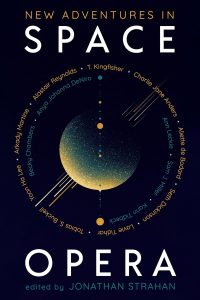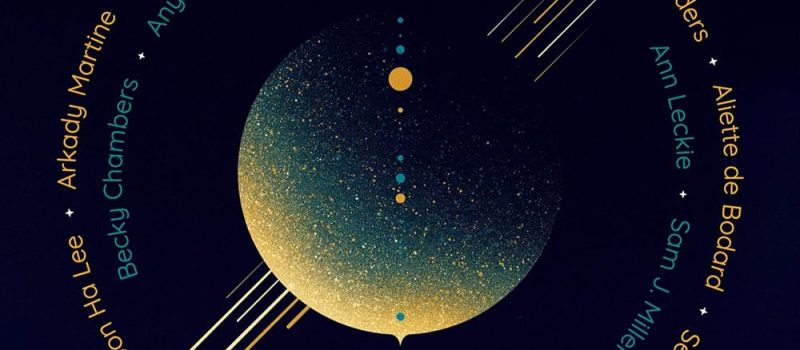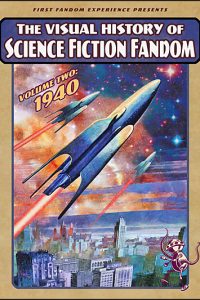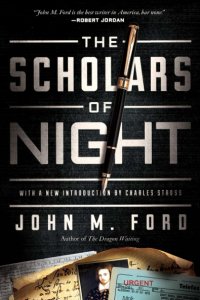New Adventures in Space Opera edited by Jonathan Strahan : Review by Gary K. Wolfe
 New Adventures in Space Opera, Jonathan Strahan, ed. (Tachyon 978-1-61696-420-7, $18.95, 336pp, tp) August 2024.
New Adventures in Space Opera, Jonathan Strahan, ed. (Tachyon 978-1-61696-420-7, $18.95, 336pp, tp) August 2024.
Dating back more than 80 years, space opera is almost certainly the longest-running term in continuous use for a particular kind of SF – though we’ll probably never finish arguing over whether it’s a mode, a subgenre, a theme, or (in the eyes of some) a mistake. In 2003, Locus ran a special issue on something then called the New Space Opera, and within a few years came a flurry of anthologies like David Hartwell & Kathryn Cramer’s The Space Opera Renaissance (2006) and Gardner Dozois & Jonathan Strahan’s The New Space Opera (2007) and The New Space Opera 2 (2009), both of which consisted of original stories. A long parade of anthologies has followed, including Bryan Thomas Schmidt’s weighty Infinite Stars: Dark Frontiers: The Definitive Anthology of Space Opera (2019), so it’s pretty clear that the notion isn’t going away anytime soon. Now Strahan has rejoined the discussion with New Adventures in Space Opera, including fourteen stories originally published between 2012 and 2023. (Customary Good Breeding disclosure: Jonathan is my podcast partner and the reviews editor of this magazine.) The fact that it’s a reprint anthology may be significant. Original theme anthologies can be terrific, because they offer stories no one has seen before – but which are submitted, usually, as the result of a prompt or suggestion on the part of the editor. They’re stories which have been nudged. Reprint anthologies, however, show us how authors keep returning to the theme entirely unprompted, a point that Strahan makes in his quite useful introduction, which cites recent novels by Nnedi Okorafor, Tade Thompson, Emily Tesh, and Maurice Broaddus, as well as several authors included in the book.
Perhaps not surprisingly, space opera has grown even more diverse, queerer, and more complex in the 15 years since The New Space Opera 2. Strahan has even unearthed a number of stories by authors not usually associated with the form, such as Sam J. Miller, Anya Johanna DeNiro, T. Kingfisher, and Karin Tidbeck. In Miller’s “Planetstruck”, a sex worker who traffics in information gleaned from his clients faces a tough moral decision when his home planet is suddenly cut off from the rest of the universe (some sly allusions to Le Guin and Borges add to the tale’s texture). DeNiro’s “A Voyage to Queensthroat” hits pretty close to home in telling of a skilled warrior who is also a trans woman “on a moon that had suddenly become unfriendly to me” because of some ominous-sounding “Pure Laws”. Kingfisher’s “Metal Like Blood in the Dark” recalls some classics of machine intelligence like Zelazny’s “For a Breath I Tarry”; Brother and Sister, machines designed by a human Father, are left on their own when he leaves for medical treatment, and faced with a powerful enemy, are forced to teach themselves the concept of lying.
One might easily conclude, in fact, that such moral dilemmas are a common characteristic of contemporary space opera, along with questioning familiar concepts such as empire and progress. As with Kingfisher’s story, the dilemma in Tobias Buckell’s “Zen and the Art of Spaceship Maintenance” (how many people still remember the Robert Pirsig book to which that title alludes?) is faced by a machine: a maintenance and salvage robot involved in a good old-fashioned space war; here the puzzle is to find a way around a conundrum generated by a version of Asimov’s laws of robotics. Another space war, offering a chance of redemption for a humanity long ago vanquished by aliens, is at the center of Seth Dickinson’s “Morrigan in the Sunglare”, perhaps the most purely action-packed tale here, and the one most directly recalling the military-SF branch of space opera. The skilled use of a second-person viewpoint effectively drops the moral problem in our laps in Arkady Martine’s “All the Colors You Thought Were Kings”, featuring privileged clone kids, an assassination plot, and an Imperial battle cruiser whose very presence seems to proclaim the story’s classic space opera roots.
Because of its scope, space opera is more often associated with novels than short fiction, and several of the selections involve settings more fully developed in the authors’ novels. Becky Chambers returns us to the world of her Wayfarers series with “A Good Heretic”, which explores more fully an aspect of the reclusive Sianat culture with its odd ritual of “infection” – and, of course, a moral dilemma faced by a young person who grows curious about those who choose to resist the transformation. The longest story in the book, and one of the best (and at times funniest), is “Extracurricular Activities”, which is a kind of prequel to Yoon Ha Lee’s Ninefox Gambit, featuring an earlier adventure of the redoubtable spy and assassin Shuos Jedao (who doesn’t seem much bothered by moral dilemmas at all). Alastair Reynolds’s “Belladonna Nights”, a kind of galactic family reunion saga of the scattered versions of humanity that populate the far future universe of his House of Suns, manages to convey in a relatively concise, well-plotted tale much of the Stapledonian awesomeness of scale of a full space opera. With “Immersion”, Aliette de Bodard returns us to her far-future Xuya universe, but with a surprisingly intimate tale that begins with, of all things, an unexpectedly huge catering order at a family restaurant. None of these stories, fortunately, require any prior familiarity with their settings.
Nearly all of these stories allude in various ways to earlier space opera traditions, but the writers who seem to be having the most fun with them are clearly both students of the form. Lavie Tidhar’s “The Old Dispensation” lets us know from its first sentence that we’re in an all-Jewish galactic empire: “The Yom Kippur-class Adjudicator starship Vey Is Mir left the planet of New Jerusalem at twelve oh five hundred hours Temple Mean Time, en route to the planet Kadesh.” The story itself has its grim moments, however, told from the dual points of view of a collective narrator called the Exilarch and their prisoner Shemesh. Probably the most playful tale is Charlie Jane Anders’s “A Temporary Embarrassment in Spacetime”, which has something of the dimensions of a tall tale, perhaps one of the distant ancestors of space opera. It begins with an escape from a ridiculously huge would-be god called the Vastness – “a ball of flesh in space, half the size of a regular solar system,” and slyly alludes to everyone from Tom Godwin to Douglas Adams – not to mention Hall and Oates. Space opera’s roots may be even more far-flung than we thought.
Interested in this title? Your purchase through the links below brings us a small amount of affiliate income and helps us keep doing all the reviews you love to read!
Gary K. Wolfe is Emeritus Professor of Humanities at Roosevelt University and a reviewer for Locus magazine since 1991. His reviews have been collected in Soundings (BSFA Award 2006; Hugo nominee), Bearings (Hugo nominee 2011), and Sightings (2011), and his Evaporating Genres: Essays on Fantastic Literature (Wesleyan) received the Locus Award in 2012. Earlier books include The Known and the Unknown: The Iconography of Science Fiction (Eaton Award, 1981), Harlan Ellison: The Edge of Forever (with Ellen Weil, 2002), and David Lindsay (1982). For the Library of America, he edited American Science Fiction: Nine Classic Novels of the 1950s in 2012, and a similar set for the 1960s. He has received the Pilgrim Award from the Science Fiction Research Association, the Distinguished Scholarship Award from the International Association for the Fantastic in the Arts, and a Special World Fantasy Award for criticism. His 24-lecture series How Great Science Fiction Works appeared from The Great Courses in 2016. He has received six Hugo nominations, two for his reviews collections and four for The Coode Street Podcast, which he has co-hosted with Jonathan Strahan for more than 300 episodes. He lives in Chicago.
This review and more like it in the August 2024 issue of Locus.
 While you are here, please take a moment to support Locus with a one-time or recurring donation. We rely on reader donations to keep the magazine and site going, and would like to keep the site paywall free, but WE NEED YOUR FINANCIAL SUPPORT to continue quality coverage of the science fiction and fantasy field.
While you are here, please take a moment to support Locus with a one-time or recurring donation. We rely on reader donations to keep the magazine and site going, and would like to keep the site paywall free, but WE NEED YOUR FINANCIAL SUPPORT to continue quality coverage of the science fiction and fantasy field.
©Locus Magazine. Copyrighted material may not be republished without permission of LSFF.










